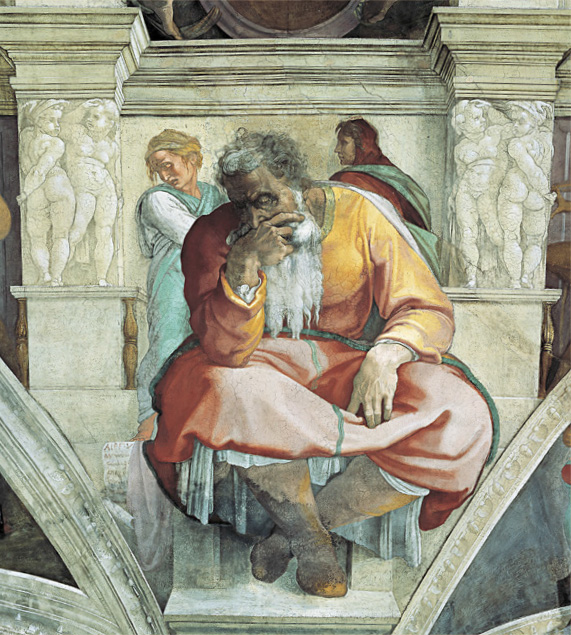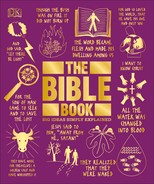
IN BRIEF
Jeremiah 1–52
Predestination
Around 626–570 BCE Jerusalem.
Jeremiah Selected by God to be a prophet “to the nations.” Born in Anathoth, a few miles north of Jerusalem, where his father Hilkiah was a priest.
Hananiah A false prophet preaching against Jeremiah.
When God declares Jeremiah a prophet He assigns him an unenviable mission: Jeremiah must make the people of Judah repent for years of bad behavior. Though faced with hatred and adversity, the reluctant prophet continues to discharge his task and spread the word of God right up until the end of his life.
Jeremiah is regarded, after Isaiah, as the second major prophet of the latter “writing” prophets in Judaism (earlier figures, such as Elijah, were “oral” prophets, who did not record their words). He is also known as the “Weeping Prophet,” as his eponymous book, written around 585 BCE, with the help of the scribe Baruch, is deeply melancholic. The epithet is apt, given the nature of the prophet’s lifelong travails. Such is the notoriety of Jeremiah’s thankless struggles that to this day an angry or miserable person is often referred to as a “Jeremiah.” God selected Jeremiah before he was even born to exhort the people of Judah to mend their idolatrous and disrespectful ways. He later tells Jeremiah He made him a prophet “in the womb” (Jeremiah 1:5). Despite an initial reluctance to accept his role, Jeremiah ultimately accepts that his life’s work is predestined, and faithfully follows God’s carefully mapped plan throughout his life.

Called to God’s work
Jeremiah was born in Anathoth, a small village 4 miles (6km) north of Jerusalem, the son of Hilkiah, a priest. His lineage can be traced back to Moses, and there are several parallels in the two men’s lives. Just as Moses demurs when God instructs him to lead the Israelites out of Egypt, the young Jeremiah makes excuses as to why he is not fit to extract the repentance of the people of Judah and fulfill the mission that God has assigned to him. He protests to God that he is too young to take on such a role and, like Moses, is not a sufficiently good speaker to cope with such a weighty task. In response, God reassures Jeremiah, as He did Moses, telling the prophet not to fear, as He will support and rescue him. The Lord then touches Jeremiah’s mouth and says to him, “I have put my words in your mouth. See, today I appoint you over nations and kingdoms to uproot and tear down, to destroy and overthrow, to build and to plant” (1:9–10)
A dangerous mission
Won over by God’s words, Jeremiah prepares to try and reconvert the errant sons and daughters of Judah. He begins his ministry around 626 BCE, in what was a tumultuous period for the people of Israel. The message was dire. God was calling on him to prophecy a severe, cataclysmic event to the people—the destruction of their holy city Jerusalem by the Babylonians. Jeremiah’s task was to remind the people of their covenant with God and to dissuade them from breaking the laws associated with it, despite any opposition he faced. Of their many crimes, the idolatrous worship of the false god Baal represented a particularly disturbing offense. They had constructed high altars to Baal, in which they burned their own children as sacrificial offerings.
Jeremiah’s prophecies of doom and destruction are unpopular and he becomes the target of much mockery, and several attempts are made to kill him. When Jeremiah complains to God that he has become a laughing stock for spreading the word of the Lord, he is told that he is destined to endure more painful attacks over the course of his mission. He cries and laments (the following biblical book, Lamentations, is a further highly poetic expression of grief). Still God insists that the prophet must continue to disseminate His dire warnings to the people of Judah. Further misfortunes befall Jeremiah; he is beaten and held in the stocks for a day (20:2), and at one point is thrown into a dark and muddy well (38:6).
Predestination
The theological concept of “predestination” holds that all events are willed and predetermined by God. The theory is aired in the Bible in Jeremiah 1:5, Romans 8:29, and Ephesians 1:5–14. The “paradox of free will,” long a subject of theological debate, is the apparent incompatibility between God’s omniscience and the free will of a human being. In the ways shown in the Bible, predestination usually amounts to a form of religious determinism or predeterminism. The dilemma that Christians face is whether they are able to freely make choices of their own volition, as opposed to choices that are predetermined by God. Scholars have labored over the question for centuries. The general consensus is that not all people live predestined lives and therefore enjoy free will. However, in Jeremiah’s case, he had little choice in the path that his life would take; the events shaping his existence were preordained by God when he was in his mother’s womb.
“Call to Me and I will answer you and tell you great and unsearchable things you do not know.”
Jeremiah 33:3

Battles with false prophets
While Jeremiah is busy spreading his apocalyptic messages, other prophets are at work, sending out a more positive message of peace and prosperity (Jeremiah 27–28). The most famous of these is Hananiah, with whom Jeremiah clashes throughout much of the central part of his narrative.
Things come to a head early in the reign of King Zedekiah in Jerusalem. Jeremiah is determined to ensure Jerusalem’s surrender in the face of the rapidly advancing Babylonian forces. He puts on a yoke, or oxen harness, to symbolize what God has told him about the coming enslavement of the Israelite people to the Babylonians. The prophet then goes to Zedekiah, wearing the yoke, and says, “Bow your neck under the yoke of the king of Babylon” (27:12–13), so that he and the nation might not die by “the sword, famine, and plague.” Jeremiah denounces the false prophets who favor opposition to Babylon, as God has told him that can only lead to Judah’s downfall. He goes on to tell the priest and people, “Serve the king of Babylon and you will live. Why should this city become a ruin?” (27:17).
The people, angry and afraid, react badly to Jeremiah’s words. Later, the false prophet Hananiah seizes his chance and tears the yoke from Jeremiah’s neck and breaks it on the ground, declaring that the Lord will break the yoke of Nebuchadnezzar II within two years.
As in many other parts of his story, Jeremiah continues his mission despite his humiliation. The Lord tells him to go to Hananiah and say that in place of a wooden yoke, he will get a yoke of iron. Jeremiah also prophesies that Hananiah will be dead within a year, for inciting rebellion against the Lord—a statement that proves accurate.
Destruction foretold
Jeremiah’s terrible prophecies do eventually come true; the people witness their city being completely destroyed by the Babylonians and most of their people are taken into captivity. The survivors go to Jeremiah and ask for forgiveness. They acknowledge that they should have listened to him and repented of their wrongdoing. They also ask his advice for where to go next. However, when he tells them “Do not go to Egypt” (42:19), Jeremiah is once more maligned by the people he is trying to save: he is branded a liar and taken to Egypt with the Israelites, where he dies soon afterward. Some extra-biblical sources suggest that he was stoned to death by his angry countrymen.
A new covenant
Not all of the Book of Jeremiah prophesies misery and despair. Chapters 29–31 strike a fresh tone of positivity. In a letter to those exiled in Babylon, God speaks through Jeremiah, telling him he will bring them back after 70 years and promising them a new covenant. This covenant will succeed because God will put it in their mind, “write it on their hearts” and “forgive their wickedness and will remember their sins no more” (Jeremiah 31:33–34).
This prophecy at the heart of the Book of Jeremiah gave the Jewish people great hope after the fall of Jerusalem in 586 BCE. Early Christians often applied the prophecy to Jesus. His death on the cross was seen to herald the promised new covenant, as it showed God’s forgiveness of their sins (Luke 22:20).

Jeremiah

The Prophet Jeremiah was the last prophet that God sent to preach to the southern kingdom, home to the tribes of Benjamin and Judah. God had repeatedly warned the Israelites to cease their idolatrous worship and evil deeds, but his preaching had been continually ignored. With the 12 tribes split, and the 10 northern tribes lost among the Assyrians, God’s decision to appoint Jeremiah as His prophet constituted His final attempt to bring the errant southern tribes back into His fold. Jeremiah was around 17 years old when God called upon him. Privy to God’s most terrible plans for his compatriots, he cried tears of sadness, because not only did he know what was going to happen to the Israelites, he was unable to convince them of his knowledge. Although he preached for 40 years, often entirely unaided, he was unable to change or soften the stubborn hearts and minds of the Israelite people. In the face of great hardships, Jeremiah’s legacy lies in the courage he showed by teaching the word of God despite the significant aversion to His message.
See also: Moses and the Burning Bush • The Golden Calf • Elijah and the Prophets of Baal • The Fall of Jerusalem • Rebuilding Jerusalem
